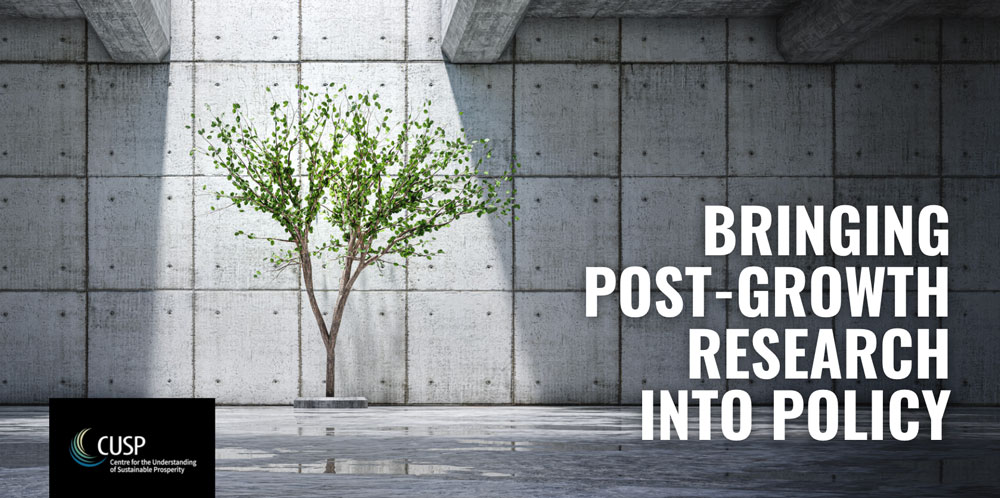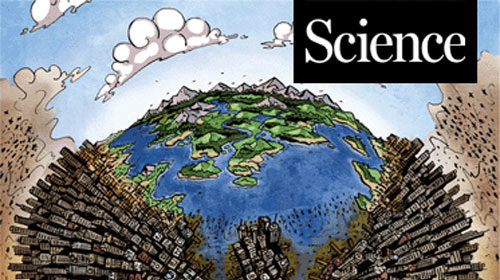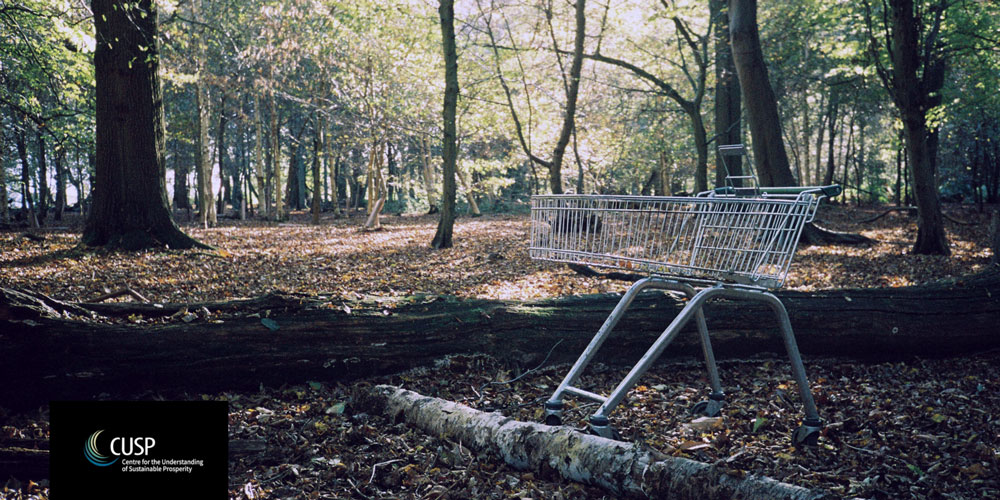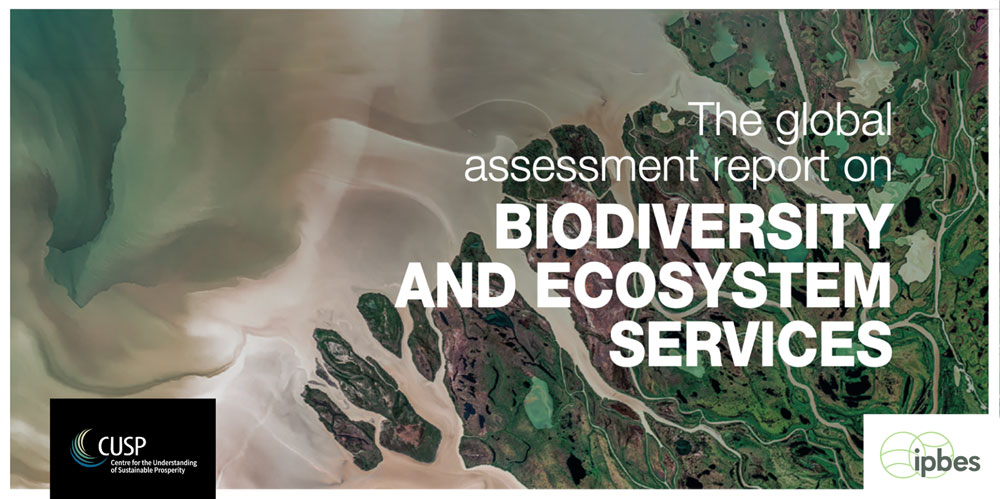The secretariat for the All-Party Parliamentary Group on Limits to Growth is provided by the Centre for the Understanding of Sustainable Prosperity (CUSP), an internationally leading research organisation, dedicated to tackling the ‘Post-Growth Challenge‘.
The overall research question is: What can prosperity possibly mean in a world of environmental, social and economic limits?—CUSP works with people, policy and business to address this question, developing pragmatic steps towards a shared and lasting prosperity.
On this page you’ll find a selection of external links to CUSP’s research in the field. For a full picture of CUSP’s multi-disciplinary research agenda, please go to the CUSP homepage.

Confronting the dilemma of growth
This commentary by Tim Jackson, Jason Hickel and Giorgos Kallis responds to a recent article purporting to identify ‘limits to degrowth’. This paper here clarifies and sets in context the tensions between growth rates and decoupling rates on which the contested argument is based, disputing the claim that growth is the best way to achieve high rates of decoupling.

Growth dependency in the welfare state—An analysis of drivers in the UK’s adult social care sector and proposals for change
Modern economies rely on economic growth for stability and prosperity, but this dependence is ecologically unsustainable. Understanding growth dependency is crucial. This peer-reviewed journal paper proposes a sector-led framework to transform these reliances and disrupt their inevitability.
Post Growth and the North-South Divide: a post-Keynesian stock-flow consistent analysis
This CUSP working paper describes a two-region post-Keynesian stock-flow consistent macroeconomic model set out to analyse macroeconomic implications of a postgrowth transition in advanced countries on the economic and environmental conditions in the rest of the world.

Towards a Model of Baumol’s Cost Disease in a Postgrowth Economy
This CUSP working paper describes an extension of the stock-flow consistent FALSTAFF model to test the existence of a monetary growth imperative. The extension is designed to simulate the phenomenon known as Baumol’s cost disease which arises from the existence of differential labour productivity rates in a mixed economy.
Degrowth can work—here’s how science can help
Wealthy countries can create prosperity while using less materials and energy if they abandon economic growth as an objective. This Nature comment piece is laying out the key challenges.
A home for all within planetary boundaries: pathways for meeting England’s housing needs without transgressing national climate and biodiversity goals
Secure housing is a fundamental human right . However, potential conflicts between housing and sustainability objectives remain under-researched. This paper explores the impact of current English government housing policy, and alternative housing strategies, on national carbon and biodiversity goals.
Bringing postgrowth research into policy
Drawing lessons from a six-month project funded by the Laudes Foundation, as well as from a wider review of evidence, this report analyses the barriers to bringing postgrowth research into policy. It concludes by making recommendations on the keys to doing this more effectively.
Beyond the Debt Controversy—Reframing fiscal and monetary policy for a post-pandemic era
In the years since the financial crisis, a heated debate has broken out amongst macroeconomists about the appropriate roles of fiscal and monetary policy in managing public sector debt. A working paper and accompanying policy briefing introduce the main lines of argument on both sides of the controversy. CUSP researchers find that a return to fiscal austerity would be both dangerous and unjustified and that moving beyond ideology is key to the levelling-up agenda.
Aligning the UK’s economic goals with environmental sustainability
Ahead of hearings planned for 9 February 2022, the UK Environmental Audit Committee invited written submissions to examine how the UK Government could incorporate environmental sustainability into its leading measures of UK economic success, addressing questions around ‘inclusive wealth’, measurement of national wellbeing, and national government accounting.
Tackling growth dependency—the case of adult social care
This paper presents a systematic approach to identifying, analysing and transforming growth dependencies in the welfare state. Using adult social care as our case study, we explore how growing demand, rising costs and rent seeking can create growth dependencies. We analyse the structures that drive and reinforce these growth dependencies and, in so doing, identify fruitful levers for transformation and mitigation.

Enabling transformative economic change in the post‐2020 biodiversity agenda
A new joined-up post-Covid biodiversity policy paper argues that addressing biodiversity loss requires a transformative change of the global economic system, and concludes that the COVID‐19 pandemic, and current delays in the negotiation of the post‐2020 global biodiversity agenda of the Convention on Biological Diversity heighten the urgency to build back better for biodiversity, sustainability, and well‐being.
Improved environmental and social outcomes are possible even as the growth rate declines to zero
This CUSP study presents a stock-flow consistent (SFC) macroeconomic simulation model for Canada. Contrary to the widely accepted view, the results suggest that ‘green growth’ (in the Carbon Reduction Scenario) may be slower than ‘brown growth’. More importantly, Prof Tim Jackson and Prof Peter Victor show (in the Sustainable Prosperity Scenario) that improved environmental and social outcomes are possible even as the growth rate declines to zero.
Recovery or Renewal? Time for an economic rethink | NATURE article
Global economic stability could be difficult to recover in the wake of the Covid-19: Analysis by Craig Rye and Tim Jackson suggests that the economies of countries such as America, the UK and Germany should prepare for a long slow recovery with prolonged periods of instability. “The global economy is facing one of the largest downturns since the Great Depression in the 1930s. Placing the economy on hold to prevent unfathomable human tragedy from the Covid-19 pandemic was the right decision. Trying to force our way back to economic growth now would be the wrong one. A post-growth world is the new normal”, Tim Jackson says, “It’s time to rethink and remake the economic models that have been failing us for decades. The challenge is enormous. But so is the prize. CSD theory suggests that a resilient, sustainable economic system which protects the health of people and planet is now within our grasp.”
Confronting inequality in the “new normal”
Post‐pandemic recovery must address the systemic inequality that has been revealed by the coronavirus crisis. The roots of this inequality predate the pandemic and even the global financial crisis. They lie rather in the uneasy relationship between labor and capital under conditions of declining economic growth, such as those who have prevailed in advanced economies for almost half a century. This paper by Prof Tim Jackson and Prof Peter Victor explores the dynamics of that relationship using a simple stock‐flow consistent (SFC) macroeconomic model of a closed economy. It examines in particular the role of two key factors—the savings rate and the substitutability (elasticity of substitution) between labor and capital—on the severity of systemic inequality under conditions of declining growth.
Unravelling the claims for (and against) green growth
It is clear that the larger the economy becomes, the more difficult it is to decouple that growth from its material impact. This isn’t to suggest that decoupling itself is either unnecessary or impossible. On the contrary, decoupling wellbeing from material throughput is vital if societies are to deliver a more sustainable prosperity—for people and for the planet. (This article by Prof Tim Jackson and Peter Victor is posted on the Science website).
Welfare systems without economic growth: A review of the challenges and next steps for the field
Welfare systems across the OECD face many combined challenges, with rising inequality, demographic changes and environmental crises likely to drive up welfare demand in the coming decades. Economic growth is no longer a sustainable solution to these problems. It is therefore imperative that we consider how welfare systems will cope with these challenges in the absence of economic growth. We review the literature tackling this complex problem.
Energy Transition Risk: The impact of declining energy return on investment (EROI)
Recent CUSP modelling work shows that the negative effects associated with the transition—recession, stagnation, stagflation, increasing inequality and asset stranding—are positively related to the capital intensity of green energy production and reductions in EROI. Policy makers should pay close attention to the overall EROI of the entire energy system when determining energy policy. If significant reductions in EROI are unavoidable, then policy could be used to mitigate some of its negative economic effects.
Modelling Transition Risk—Towards an Agent-Based, Stock-Flow Consistent Framework
The recent TRansit project—funded by the ESRC Rebuilding Macroeconomics Network—pioneered a novel agent-based, stock-flow consistent macro-economic model. The AB-SFC model developed in this project (TRansit) allows the user to study a wide range of macro dynamics that emerge from the interactions of heterogeneous actors across several sectors of the economy under conditions of imperfect information and bounded rationality. The preliminary results reported are conceptual in nature, but the framework allows us to explore questions of price stability, distributional equity, asset stranding and financial transition risk within a single macroeconomic framework.
Worker wellbeing and productivity in advanced economies: Re-examining the link
Labour productivity is a key concept for understanding the way modern economies use resources and features prominently in ecological economics. Ecological economists have questioned the desirability of labour productivity growth on both environmental and social grounds. This CUSP paper finds there is experimental evidence demonstrating a causal effect of worker wellbeing on productivity, but that the relationship can also sometimes involve resource-intensive mediators. Taken together with the evidence of a negative impact on worker wellbeing from productivity growth, the review concludes that a relentless pursuit of productivity growth is potentially counterproductive, not only in terms of worker wellbeing, but even in terms of long-term productivity.
Ensuring a Post-COVID Economic Agenda Tackles Global Biodiversity Loss
The COVID-19 pandemic has caused dramatic and unprecedented impacts on both global health and economies. Many governments are now proposing recovery packages to get back to normal, but the 2019 Intergovernmental Science-Policy Platform for Biodiversity and Ecosystem Services Global Assessment indicated that business as usual has created widespread ecosystem degradation. A post-COVID world needs to tackle the economic drivers that create ecological disruptions; this paper explores the details.
Emergence of new energy-transition models: A review
Well-known academic and non-academic institutions call for a new approach in economics able to capture features of modern economies including, but not limited to, complexity, non-equilibrium and uncertainty. In this paper, we provide a systematic review of ecological macroeconomic models that are suitable for the investigation of low-carbon energy transitions and assess them based on the features considered desirable for a new approach in economics.
Biodiversity in a post-growth environment | EAC Possible Future Inquiry
In early Spring 2020, written submissions were invited to aid the Committee in prioritising its future programme of work. CUSP director Tim Jackson submitted evidence, making the case for necessary innovations in governance and a realistic and responsible approach to the management of the economy: Sustainable Development Goals and the 2050 Vision for Biodiversity cannot be achieved without transformative change, the conditions for which have to be put in place now.
A tale of two utopias: Work in a post-growth world
This paper aims to contribute to the literature on post-growth futures. Modern imaginings of the future are constrained by the assumptions of growth-based capitalism. To escape these assumptions we turn to utopian fiction.
Global Assessment Report on Biodiversity and Ecosystem Services
In 2019, the United Nations Intergovernmental Platform on Biodiversity and Ecosystem Services (IPBES) published a comprehensive review of biodiversity. With CUSP director Prof Tim Jackson as contributing author to Chapter 6 ‘Options for Decision Makers‘, the review recognises that “a key element of more sustainable future policies is the evolution of global financial and economic systems to build a global sustainable economy, steering away from the current limited paradigm of economic growth“.
Energy and Productivity—a review of the literature
The UK is experiencing a period of low productivity growth. Although exacerbated by the financial crisis of 2008, the underlying trend is longer and more persistent. This CUSP report to the ESRC—as part of the ESRC’s investigation into productivity research—aims to expand conventional understandings of productivity by exploring the literatures which relate productivity to the availability, production and use of energy in the economy. It concludes that fossil fuel energy use drives climate change, which is likely to reduce productivity levels. Reductions in the quality of available energy may also impact productivity in a number of ways. Mitigating these impacts will require transformative changes in the way we use energy, and potentially also a rethinking of productivity growth itself.
Wellbeing and Productivity: A Review of the Literature
This CUSP report to the ESRC—as part of the ‘Powering Productivity’ project—reviews the relationships between the different aspects of wellbeing, productivity, and productivity growth. It is the culmination of a desk-based evidence review, survey, and a mapping workshop held with experts from backgrounds including psychology, sociology, economics, and design. The report concludes that, although wellbeing may be a determinant of higher levels of productivity, the way in which we pursue productivity growth also appears to have the potential to undermine wellbeing.
HM Treasury’s Decarbonisation of the UK Economy and Green Finance Inquiry | Evidence Submissions
Earlier this year, the UK Treasury Select Committee launched an inquiry into the decarbonisation of the UK economy and green finance, set out to scrutinise the role of the Treasury department, regulators and financial services firms in supporting the UK Government’s climate change commitments. Drawing on recent CUSP reports, Tim Jackson, Aled Jones and the Aldersgate Group submitted evidence.

Measuring Prosperity—Navigating the Options
Since its development in the 1930s, GDP has been the most widely used measure of the health and progress of an economy, being adopted as the principal policy objective of countless national and international bodies across the world. Its many shortcomings as a measure of progress are well documented, and the alternative indicators of progress developed in response to these shortcomings have been diverse and numerous. Commissioned by WWF, this paper synthesises the literature, highlighting the importance of context and purpose in determining what makes a ‘good’ indicator.
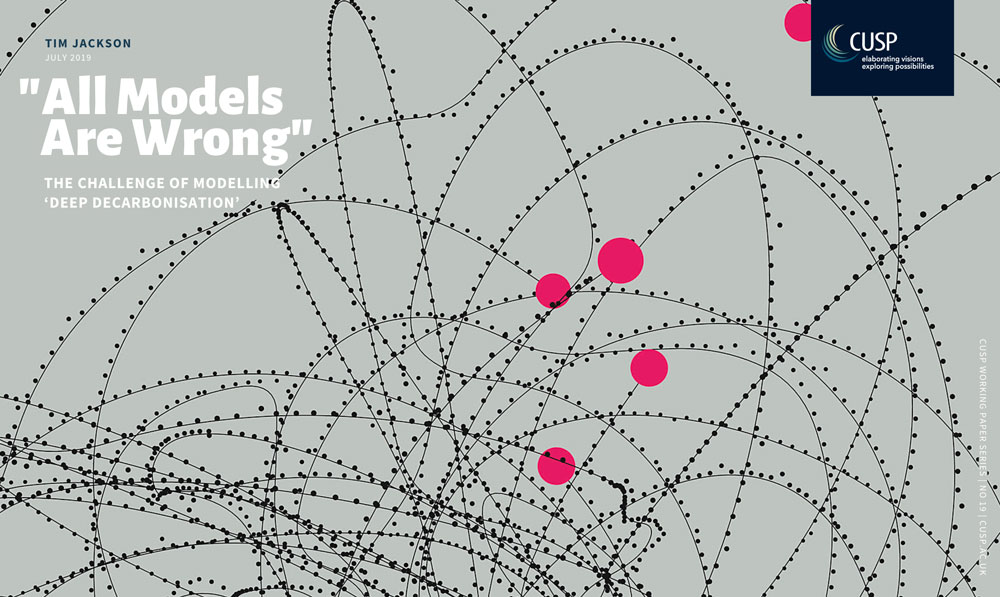
“All Models are
Wrong”—The challenge of modelling ‘deep decarbonisation’
This briefing paper summarises the dilemma associated with using mainstream, macroeconomic models to guide disruptive, transformative change such as those that might occur under ‘deep decarbonisation’: a rapid transition to a net-zero carbon economy. Some form of macro-economic modelling framework is essential to enable policy-makers to exercise short- and long-term fiscal responsibility. Incremental models based on historical behaviour, however, are a poor guide to outcomes under circumstances of disruptive change.

Zero Carbon Sooner—
The case for an early zero carbon target for the UK
New briefing paper addressing the question of when the UK should aim for zero carbon emissions. In it, Prof Tim Jackson is making the case for a (fair) zero carbon target of 2030, calling for a policy strategy not only on zero carbon targets, but emission pathways, with a defined level of negative emission technologies. It is notable that reduction rates high enough both to lead to zero carbon (on a consumption basis) by 2050 and to remain within the carbon budget require absolute reductions of more than 95% of carbon emissions as early as 2030.
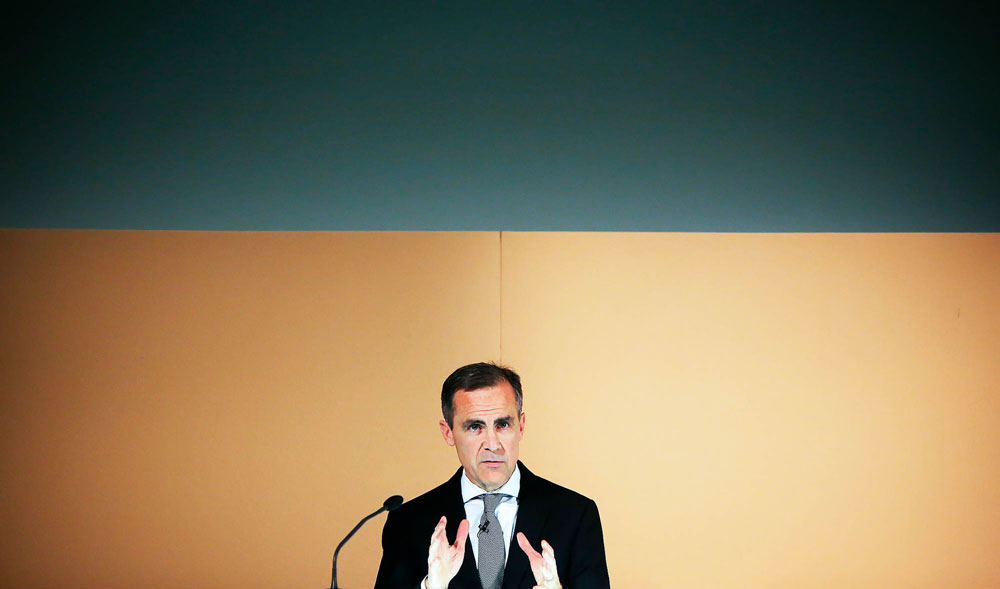
A shift in temperature—the financial challenge of a zero carbon economy
Climate emergency demands a wholescale shift away from fossil fuels. To mark the start of a new research project modelling the zero-carbon tranisiton, Tim Jackson and Andrew Jackson reflect here on the emerging concept of ‘transition risk’, a key element in the Bank of England’s response to climate change, and outline the challenges inherent in understanding and modelling it.

‘Whatever it takes’—the new economics of system change | Blog by Tim Jackson
‘System change, not climate change’ is the mantra for a new politically-charged ecological activism. In the wake of two key economic conferences, CUSP director Tim Jackson reflects on what this means for the financial and political stability of Europe. Read more.

Embracing the Unthinkable—CUSP blog by Alan Simpson on our recent policy briefing, UK’s future security and the ‘order of the soul’
The UK is becoming an angry, divided and insecure country, Alan Simpson writes. Right now, it doesn’t have to be that bad. Another world is still (just) possible, but we need the courage to build it, now. Read more.

Against all odds? Modelling the low-carbon transition
Can renewable energy supply grow rapidly enough to both, cover societies growing energy needs and displace fossil fuel use sufficiently to keep carbon emissions below some “safe” level? — the leading question of a recent CUSP paper in Ecological Economics. In this blog, Martin Sers is summarising the findings…Read More
The Post-Growth Challenge — Secular Stagnation, Inequality and the Limits to Growth
Sluggish recovery in the wake of the financial crisis has revived discussion of a ‘secular stagnation’. These conditions have been blamed for rising inequality and political instability. Tim Jackson contests this view, pointing instead to a steadfast refusal to address the ‘post-growth challenge’…Read More

‘Everything, in short, except that which makes life worthwhile’
Fifty years on from Robert Kennedy’s historic speech on the limitations of the GDP at the University of Kansas in March 1968, Tim Jackson reflects on the failings of measurement and vision which still haunt both economic policy and our everyday life…Read more

Social Limits To Growth – Lessons for a post-crash economy
On 13 November 2017, the APPG on Limits to Growth hosted an evening debate at the House of Commons, to celebrate the 40th anniversary of the publication of Social Limits to Growth by Fred Hirsch. Caroline Lucas and Tim Jackson reflect on the continuing relevance of his ground-breaking work…Read more

Why do we still worship at the altar of economic growth?
Forty years ago, Fred Hirsch pointed to a crucial flaw in the emphasis on growth as a central objective in western economies. His seminal book made the case that in addition to ecological limits, there are important social constraints at play. In this blog, his son Prof Donald Hirsch is arguing that these limitations became ever more relevant today…Read more

Broken promises—the engine of consumerism
Does consumerism thrive on our discontentment? Tim Jackson argues yes, the success of consumer society lies not in meeting our needs but in its spectacular ability to repeatedly disappoint us. This may seem dark, but from here we can understand why consumerism must eventually fall – and how to replace it…Read more
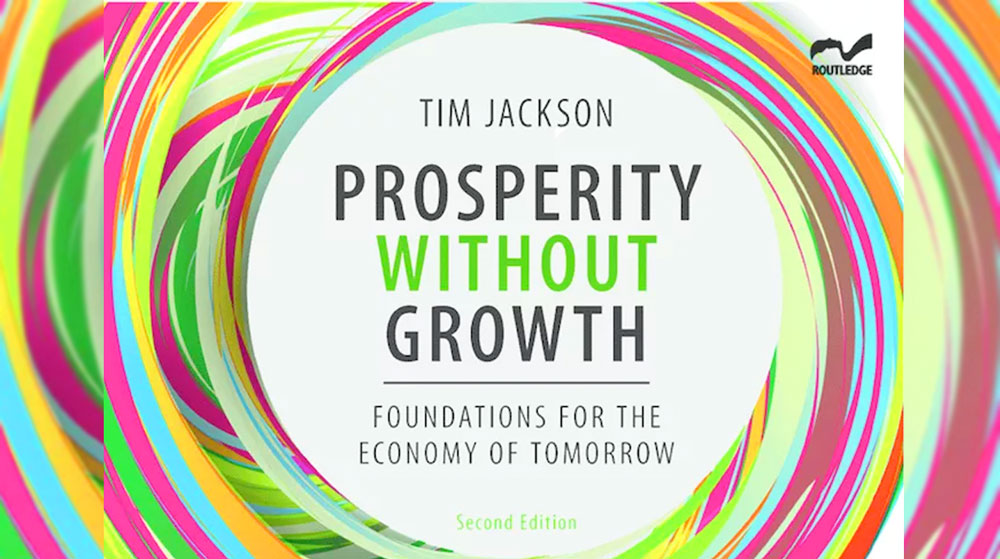
Prosperity without Growth – Foundations for the Economy of Tomorrow
The publication of Prosperity without Growth was a landmark in the sustainability debate. This substantially revised and re-written edition updates its arguments and considerably expands upon them. Tim Jackson demonstrates that building a ‘post-growth’ economy is not Utopia – it’s a precise, definable and meaningful task. It’s about taking simple steps towards an economics fit for purpose…Read more

Beyond Consumer Capitalism – Foundations for a Sustainable Prosperity
This paper explores the ramifications of the combined crises now faced by the prevailing growth-based model of economics. In paying a particular attention to the nature of enterprise, the quality of work, the structure of investment and the role of money, the paper develops the conceptual basis for social innovation in each of these areas, and provides empirical examples of such innovations…Read more





